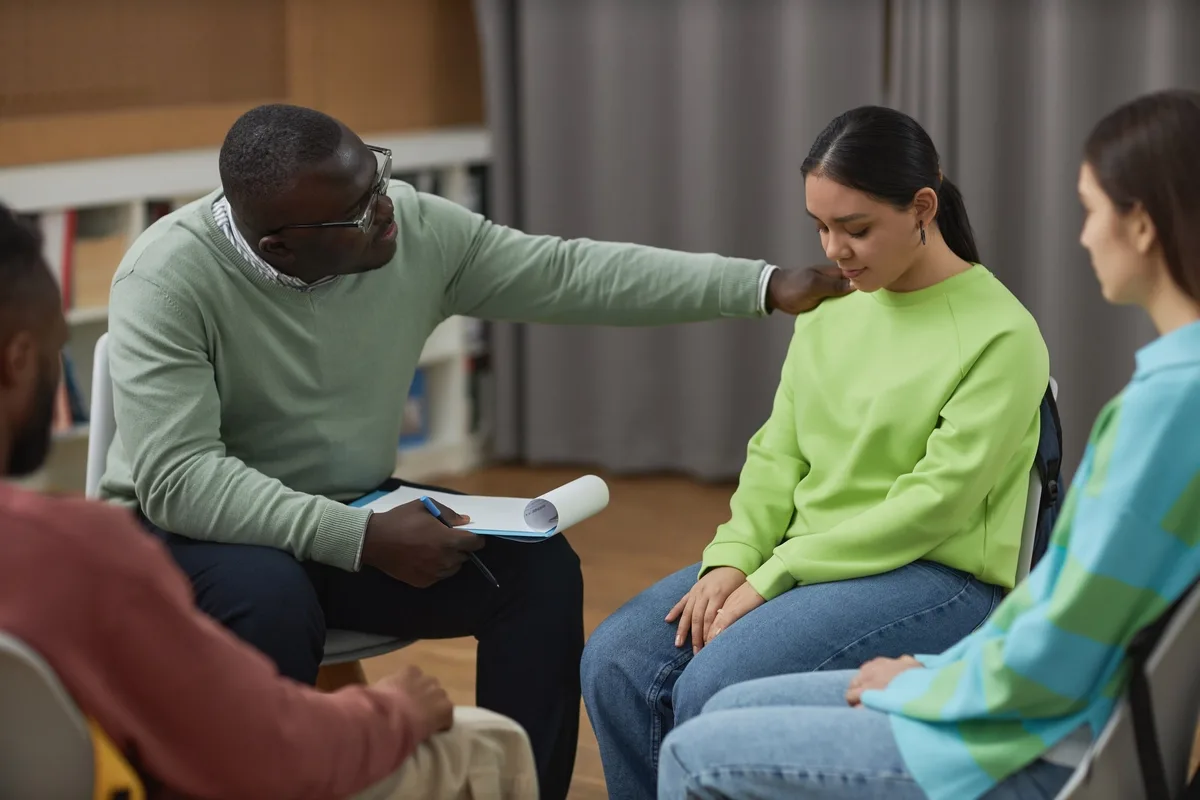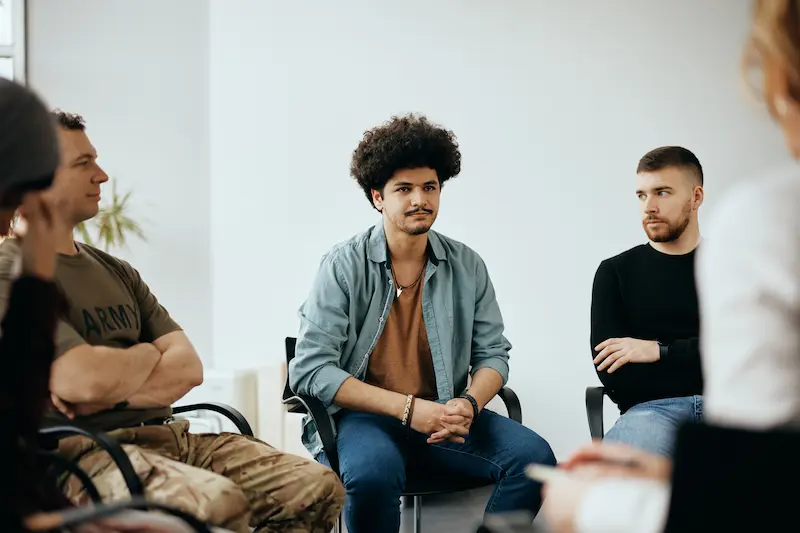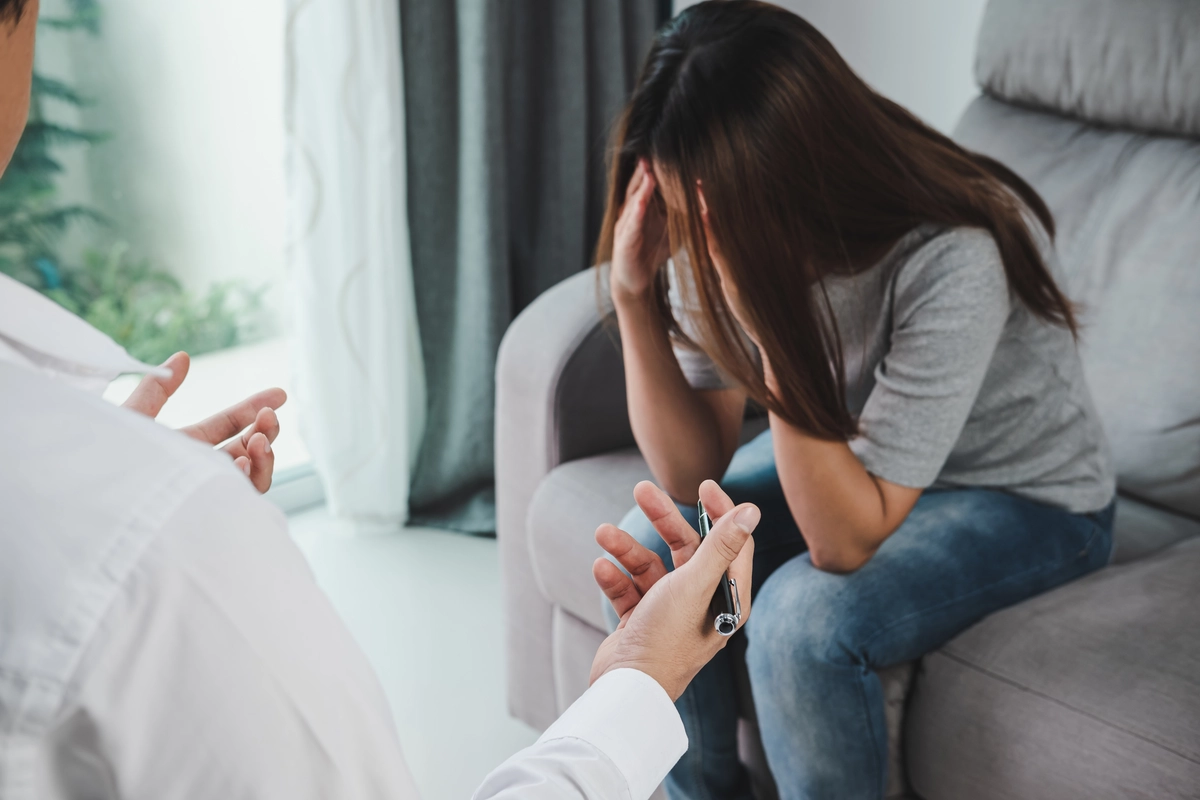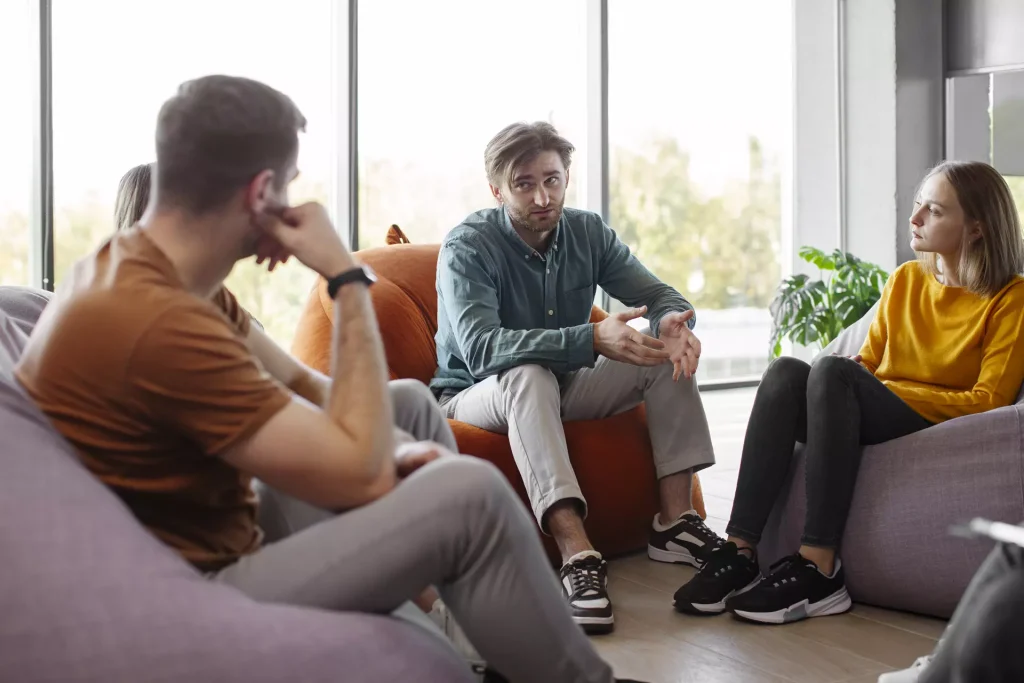24/7 Helpline:
(866) 899-221924/7 Helpline:
(866) 899-2219
Learn more about Medication-assisted Treatment centers in Marion County

Other Insurance Options

EmblemHealth

Kaiser Permanente

Optum

Health Choice

Access to Recovery (ATR) Voucher

AllWell

Carleon

WellPoint

Highmark

Magellan Health

Lucent

Medical Mutual of Ohio

BlueCross

Aetna

Sutter

Coventry Health Care

Optima

Amerigroup

Horizon Healthcare Service

Providence

Health Resources of Arkansas
Health Resources of Arkansas is a private rehab located in Yellville, Arkansas. Health Resources of ...

Life Practice Counseling
Life Practice Counseling is a non-profit rehab located in Oakland, California. Life Practice Counsel...

Friendship House
Friendship House is a residential treatment American Indian women struggling with substance abuse is...

Telecare – Heritage Psychiatric – Health Facility
Telecare – Heritage Psychiatric – Health Facility is a private rehab located in Oakland, California....

East Bay Community Recovery Project
East Bay Community Recovery Project is a private rehab located in Oakland, California. East Bay Comm...

Wistar R and R Program Wistar Redemption and Recovery
Wistar R and R Program Wistar Redemption and Recovery is a private rehab located in Oakland, Califor...

Teen Challenge – Oakland Men’s Center
Teen Challenge- Oakland Men’s Center offers alcohol and drug addiction treatment through a holistic ...

MPI Chemical Dependency Treatment Services
MPI Chemical Dependency Treatment Services offers inpatient and outpatient treatment for individuals...

Alta Bates Summit Outpatient Rehabilitation
Alta Bates Summit Outpatient Rehabilitation is a private rehab located in Oakland, California. Alta ...

West Oakland Health – Community Recovery Center
West Oakland Health–Community Recovery Center, in Oakland, California, is an outpatient mental and b...

Health Council – Mental Health Department
Health Council – Mental Health Department is a private rehab located in Oakland, California. Health ...

Horizon Services – Chrysalis
Horizon Services - Chrysalis provides social a residential treatment program for women struggling wi...

Cityteam
Cityteam is a non-profit rehab located in Oakland, California. Cityteam specializes in the treatment...

Fred Finch Youth Center
Fred Finch Youth Center is a private rehab located in Oakland, California. Fred Finch Youth Center s...

Saint Mary’s Center – Recovery 55
Saint Mary’s Center – Recovery 55 is a non-profit rehab located in Oakland, California. Saint Mary’s...

East Bay Community Recovery Project – Residential
East Bay Community Recovery Project - Residential is a private rehab located in Oakland, CA. East Ba...

Asian Community Mental Health Services
Asian Community Mental Health Services is a private rehab located in Oakland, California. Asian Comm...

Bonita House
Bonita House is a private rehab located in Oakland, California. Bonita House specializes in the trea...

HAART
HAART is a non-profit rehab located in Oakland, California. HAART specializes in the treatment of al...

BAART Programs
BAART Programs is a drug and alcohol addiction treatment center for adults in Oakland, California. A...

Lifeline Treatment Services
Lifeline Treatment Services is a private rehab located in Oakland, California. Lifeline Treatment Se...

Magnolia Women’s Recovery
Magnolia Women's Recovery is a non-profit organization that provides daily programs for pregnant, po...

VA Northern California Health Care System – Oakland Behavioral Health Clinic
The Oakland Behavioral Health Clinic, part of VA Northern California Health Care System, provides a ...

La Familia – El Chante – Recovery Home
La Familia Counseling Center is a co-occurring substance use disorder treatment facility based in Oa...

Garrett County Lighthouse
Garrett County Lighthouse is a private non-profit rehab located in Oakland, MD. Garrett County Light...

Jolimar Recovery
Jolimar Recovery offers outpatient and intensive outpatient treatment for individuals with alcohol a...

Serenity – Florham Park
Serenity – Florham Park is a private rehab located in Summit, New Jersey. Serenity – Florham Park sp...




























Preferred Family Healthcare
Preferred Family Healthcare - Highway 62 East offers outpatient services for individuals with a ment...

AA – Alcoholics Anonymous – Fruitvale Latino Grupo
Alcoholics Anonymous is an international fellowship of men and women who have had a drinking problem...

Casa de La Vida
Casa de La Vida is a private rehab located in Oakland, California. Casa de La Vida specializes in th...

Mujeres Con Esperanza
Mujeres Con Esperanza is a private rehab located in Oakland, California. Mujeres Con Esperanza speci...

Grupo De AA – Alcoholicos Anonimos
Grupo De AA – Alcoholicos Anonimos is a non-profit rehab located in Oakland, California. Grupo De AA...

Asian Pacific Psychological Services
Asian Pacific Psychological Services is a private rehab located in Oakland, California. Asian Pacifi...

Solid Foundation Mandela II
Solid Foundation Mandela II in Oakland, California provides drug rehab and alcohol addiction treatme...

Saint Mary’s Center Recovery 55
Saint Mary’s Center Recovery 55 is a non-profit rehab located in Oakland, California. Saint Mary’s C...

AA – Alcoholics Anonymous – Inbetween Fellowship
AA – Alcoholics Anonymous – Inbetween Fellowship is a non-profit rehab located in Oakland, Californi...

Healthy Babies Project – Harriet Tubman Recovery Center
Healthy Babies Project – Harriet Tubman Recovery Center is a private rehab located in Oakland, Calif...

Solid Foundation Keller House
Solid Foundation Keller House is a private rehab located in Oakland, California. Solid Foundation Ke...

Harm Reduction Therapy Center
Harm Reduction Therapy Center is a private rehab located in Oakland, California. Harm Reduction Ther...

Holistic Research Center – JFKU Counseling Center
Holistic Research Center – JFKU Counseling Center is a private rehab located in Oakland, California....

Alameda County Behavioral Health Care Services
Alameda County Behavioral Health Care Services is a private rehab located in Oakland, CA. Alameda Co...

Healthy Babies – John George Recovery Center
Healthy Babies – John George Recovery Center is a private rehab located in Oakland, California. Heal...

Savage Foundation
Savage Foundation is a private rehab located in Oakland, California. Savage Foundation specializes i...

Options Recovery Services
Options Recovery Services is a non-profit rehab located in Oakland, California. Options Recovery Ser...

Missionary Recovery Center
Missionary Recovery Center is a private rehab located in Oakland, California. Missionary Recovery Ce...

Praise Fellowship Ministries Men’s Recovery Facility
Praise Fellowship Ministries Men’s Recovery Facility is a private rehab located in Oakland, Californ...

Recovery Unlimited
Recovery Unlimited is a private rehab located in Oakland, California. Recovery Unlimited specializes...

Bi Bett Corp – East Oakland Recovery Center
Bi Bett Corp – East Oakland Recovery Center is a private rehab located in Oakland, California. Bi Be...

Solid Foundation Women’s Center
Solid Foundation Women’s Center is a private rehab located in Oakland, California. Solid Foundation ...

Solutions 4 Recovery – Drug and Alcohol
Solutions 4 Recovery – Drug and Alcohol is a private rehab located in Oakland, California. Solutions...

Horeb House – New Heights Christian Center
Horeb House – New Heights Christian Center is a private rehab located in Oakland, California. Horeb ...

Health Council Office of Substance Abuse Recovery Services
Health Council Office of Substance Abuse Recovery Services is a private rehab located in Oakland, Ca...

Grupo Mexico – AA – Alcoholicos Anonimos
Located in Oakland, California, AA – Alcoholicos Anonimos – Grupo Lucha Por Tu Vida is a drug and al...

Bi Bett Women’s Recovery Center
Bi Bett Women’s Recovery Center is a private rehab located in Oakland, California. Bi Bett Women’s R...

CURA
CURA offers a transitional living home for those adult men who want to continue their path to recove...

AA – Alcoholicos Anonimos – Grupo Lucha Por Tu Vida
AA – Alcoholicos Anonimos – Grupo Lucha Por Tu Vida is a non-profit rehab located in Oakland, Califo...

Treetop Women’s Recovery House
Treetop Women’s Recovery House is a private rehab located in Oakland, Maine. Treetop Women’s Recover...

Atlantic Health System – Overlook Medical Center Outpatient Services
Atlantic Health System - Overlook Medical Center Outpatient Services is located in Summit, New Jerse...

Mental Healthcare
Mental Healthcare is a private rehab located in Oakland, New Jersey. Mental Healthcare specializes i...




































































